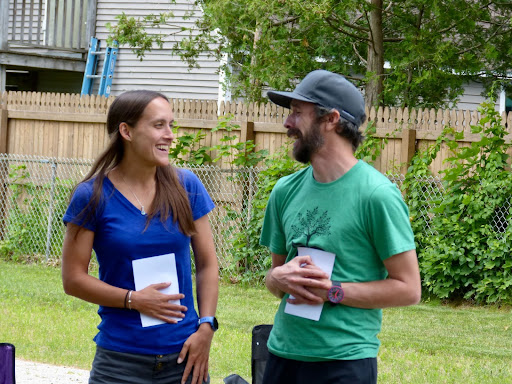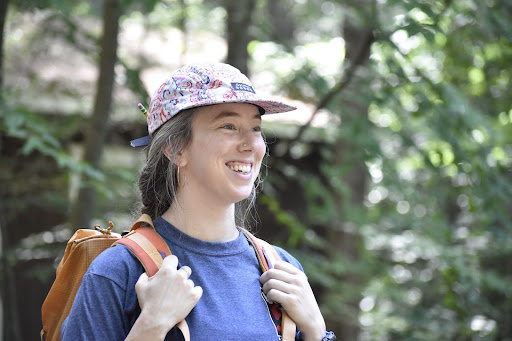Our Staff Shares Stories of Connection and Empowerment
Connect.Empower.Lead. Be the Example.
High 5’s motto is about change–changing lives, changing attitudes, changing abilities, and discovering aptitudes. It’s about finding our better self and discovering the power that comes with giving that self a voice, of giving ourselves the empowerment of agency. And it is about finding the depth within us to lead, not by direction, but rather by example—a much more challenging prospect for any leader. That’s a lofty outcome and one of the many gifts of adventure-based learning.
Challenge Experiences Invite Change
For our High 5 educators, the skills built over decades of experience in facilitating workshops and leading training programs reflect a passion and commitment to their work. There’s a deep satisfaction in this type of work because they too are learners…always learning!
Four of our team members were invited to share a story about their work, and to answer this question: What is the best example of a transformative experience from your work that exemplifies the statement: If it doesn’t challenge you it won’t change you?

Story 1 – Ryan McCormick and Sam Copland on the Edge of Leadership
Connect. Empower. Lead. Be the Example.is a motto that captures the spirit of High 5’s Edge of Leadership (EOL) program. Few people know that EOL also has a theme song: I Won’t Grow Up from the 1954 musical production of Peter Pan. Remember how that goes?

That call for a stubborn defense of youth and innocence belied Peter’s clear understanding of his responsibility for and resolve to protect the residents of Never Land from Captain Hook and the pirates. As Ryan McCormick and Sam Copland of the EOL team might put it, Peter has a strong sense of agency, of understanding his own and others’ strengths and weaknesses, his responsibility for his decisions, how those decisions affect others, and his power to self-direct, to be in control of his own life, and effect change. All that self-knowledge with no loss of childlike innocence and enthusiasm—that’s an astounding combination! That is one aim of social-emotional learning (SEL) and while its expression by today’s children may not rhyme, there’s no doubting the power of its impact.
In the hour and ½ bi-monthly EOL sessions that Ryan and Sam spend with students and teachers in their classrooms, they see change underfoot; they notice a community of learners starting to express themselves with more candor and an awareness of others.
Sam shared a few quotes from 5th graders at Keene’s Symonds School reflecting on a day of adventure learning on High 5’s challenge course, which demonstrates the social and emotional learning experience:
- “What I learned today is that it’s okay to have fear.”
- “What I learned about myself today was feeling brave and confident and that was the best feeling ever.”
- “What I learned about myself today was now I know I can go high and I just believe I can do it. Also that I can challenge myself and be proud.”
- “I felt safe and supported with my classmates cheering me on.”
Talk about thinking happy thoughts…!
Now in its 10th year of operation in Keene, NH schools, EOL has provided transformational experiences like these to thousands of students. That EOL fosters growth, increased understanding and insight in Keene’s children is beyond question. EOL’s power to change lives and shape character has become a seamless part of classroom instruction, transforming and complementing the educational experience.
Q: What is the best example of a transformative experience from your work that exemplifies the statement: If it doesn’t challenge you it won’t change you?
Ryan: A student once asked me at the conclusion of an activity, “Ryan… what was the point of that game?”
I asked for clarification and he explained, “all year everything we did had a lesson, they all had a point and taught us to look for the lesson in what we experience… but, this time I can’t see any point or lesson in that game.”
“Did you have fun?” I asked.
He thought for a second, “Yes.”
“Then I made my point.”
I could see from the head shaking and furrowed brow that he accepted that sometimes the most important lesson is to remember to have fun.
Story 2 – Phil Brown A Guide on the Side
As one of our most experienced educators and High 5’s podcast host, Phil Brown, puts it, “I’m not a sage on the stage, rather a guide on the side.” Phil has been a High 5 Trainer for over 7 years, and his objective in any training is to set up a learning experience, encourage everyone’s participation, then serve as guide and cheerleader as the experience itself determines the outcome. That outcome will vary in its impact based on each individual’s openness to change, investment of personal energy, willingness to participate, and commitment to the experience.
Phil is both watchful and vocal, observing individual behaviors and group dynamics and offering words of encouragement and support, but rarely direction. He uses positive reinforcement as a means to facilitate change, rewarding participants for a good belay, or successful negotiation of a particularly challenging obstacle. Knowing that Phil sees and respects them, understands their respective strengths and weaknesses, and recognizes how hard an activity might be for them, is an important part of every participant’s willingness to engage, throwing themselves wholeheartedly into an experience resulting in personal growth and transformational change.
Determining success in a workshop training is clear: experience leads to understanding and skill development and that, in turn, equips the participants to assume the role of instructor and recreate the same learning experience for others. Change is the desired outcome, achieved directly through the acquisition of a skill and then transferring that skill to others. It is adventure learning’s version of the hero’s journey: leaving one’s comfort zone to acquire knowledge, then sharing that newfound understanding with others. It’s an age-old tale with a modern twist.
Q: What is the best example of a transformative experience from your work that exemplifies the statement: If it doesn’t challenge you it won’t change you?
Phil: A few years back, I led a five-day training at a boarding school with a school faculty group. This was a new challenge course build and the training was a custom version of our Adventure Basics workshop. A goal of the training was to introduce the powerful impact that adventure programming can have on participants, so there is a lot of program modeling, allowing trainees to be participants in all of the activities.
One of the many benefits of this type of training is the personal growth that participants can experience that go beyond the skills acquired to run the program themselves. At the end of the training, I led a reflection activity and one of the participants described to the group that they had a challenging upbringing that had forced them to “grow up quickly” and that this training had been the first time in 50+ years that they had truly “played.” Playing had been a challenging experience for them and it was only through the support of the whole group that they were able to lower their guard and fully engage in the experience. They described the impact that this experience had had on them and how they were excited to help facilitate this for others. This moment for me was extremely touching and validates the importance of our work and the way that we conduct training.
Story 3 – Hanne Bailey: The Importance of “Why”
In High 5’s training workshops we ask participants to think critically and ask questions. As trainers, one of our goals is to be able to answer the inevitable question: Why? Why do we choose to do things a specific way? Why is it so important? In every case, we must be mindful of the why and be open both to pedagogical insights and changing industry and technical practices. The field of adventure learning is always evolving, based on experience and efforts toward mitigating risk (while still maintaining the perception of risk). And we have to stay open and receptive to those changes.
But in the midst of a training, it can be difficult to balance emotions and energies when challenging situations occur. Our work often serves as a catalyst for changes in individual awareness or organizational programming and practice. That change sometimes challenges a carefully maintained status quo, forcing us out of our comfort zones, and out of cherished beliefs that we’ve held as ‘tried and true.’ And this is where experience and empathy come to the forefront.
As educators, we never want to embarrass anyone by pointing out how risky a practice might be, or how a program goal they thought was the only result and not part of a whole host of outcomes. This can lead to defensiveness, unwillingness to participate and being closed to change. Instead, we approach challenges objectively, figure it out experientially and explore different alternatives, considering others’ perspectives and insights into potential outcomes. Together, we come to an informed, nonthreatening understanding. This practice requires empathy, compassion and discipline and yields results very similar to the scientific method—results that stand the test of challenge in the world of adventure learning.
Q: What is the best example of a transformative experience from your work that exemplifies the statement: If it doesn’t challenge you it won’t change you?
Hanne: We ask participants to acknowledge their perspectives, hear new and sometimes opposing viewpoints, then to actively engage with that unfamiliar and perhaps uncomfortable perspective. That challenge allows us to practice perspective shifting, which can expand our empathetic mindset.
Changing through challenge is a gift to ourselves because we have a greater ability to embrace more perspectives, and make deeper connections with people, nature, and the world around us. It’s a gift to others because we are–in turn–more welcoming and inclusive of them and their ideas. And it is a gift to the collective because, if we show personal change through challenge and how it has served us, then it becomes an invitation to others to challenge themselves.
In Closing
Is there a moral to these stories? Of course. Whether teaching or being taught, adventure learning is full of purpose and always evolving. The experience varies according to the need, ranging from self-discovery and increased agency to group collaboration and mutual respect and understanding. The end is always growth and that’s a gift worth experiencing.
HIGH 5 ADVENTURE LEARNING CENTER
130 Austine Drive, Suite 170
Brattleboro, VT 05301
Office: 802-254-8718
Toll Free: 877-356-4445
Fax: 802-251-7203
Privacy Policy


